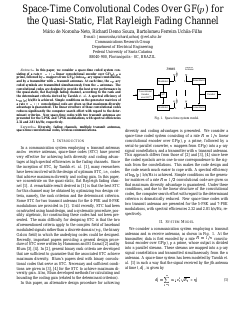
Space-Time Convolutional Codes Over GF(p) for the Quasi-Static, Flat Rayleigh Fading Channel
Mário de Noronha-Neto, Richard Demo Souza, Bartolomeu Ferreira Uchôa-Filho
DOI: 10.14209/its.2002.199
Evento: 2002 International Telecommunications Symposium (ITS2002)
Keywords: Diversity fading channels multiple transmit antennas space-time convolutional codes wireless communications
Abstract
"In this paper, we consider a space-time coded system con- sisting of a rate R = 1/n linear convolutional encoder over GF(p), p a prime, followed by n mappers from GF(p) into a p-ary signal constellation, and by a transmitter with n transmit antennas. At each time, the n p-ary coded symbols are transmitted simultaneously from the n antennas. The convolutional codes are designed to provide the best error performance in the quasi-static, flat Rayleigh fading channel, according to the rank and the determinant criteria derived by Tarokh et. al. A spectral efficiency of logs (p) b/s/Hz is achieved. Simple conditions on the generator matrices of a rate R = 1/2 convolutional code are given so that maximum diversity advantage is guaranteed. The linear structure of these convolutional codes reduces significantly the computer search effort with regard to the determinant criterion. New space-time codes with two transmit antennas are presented for the 5-PSK and 7-PSK modulations, with spectral efficiencies 2.32 and 2.81 b/s/Hz, respectively."Download